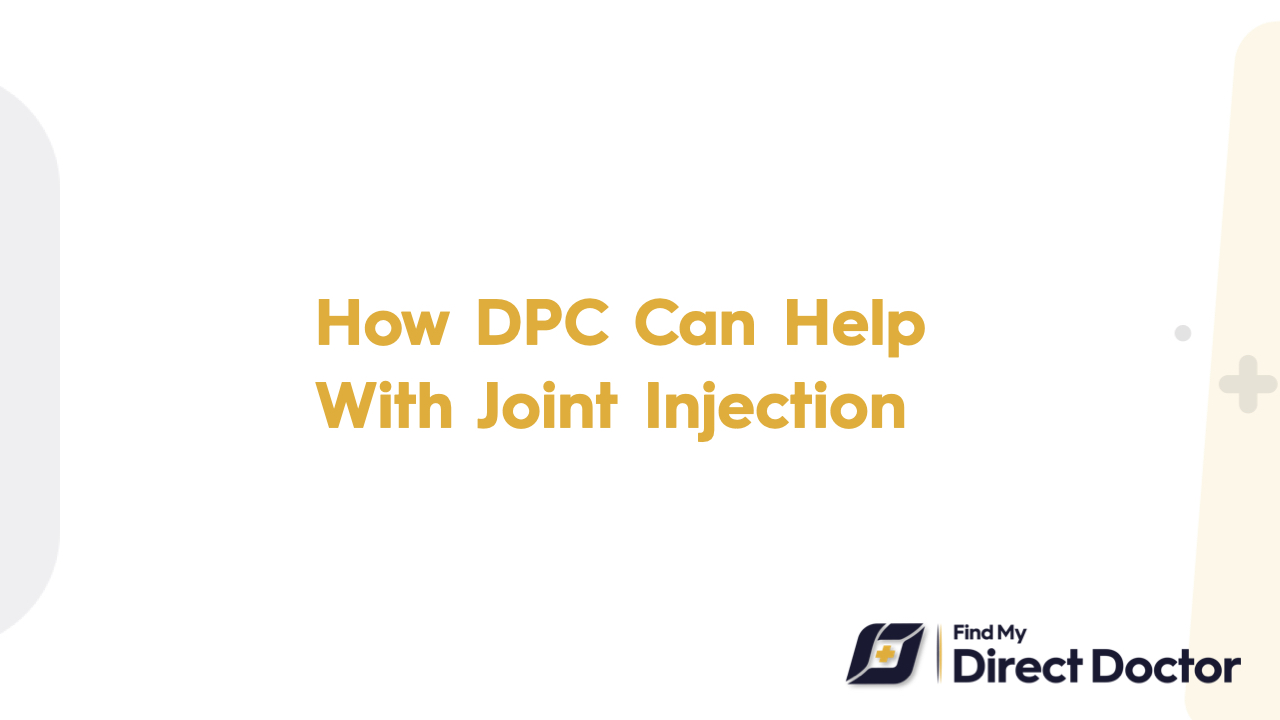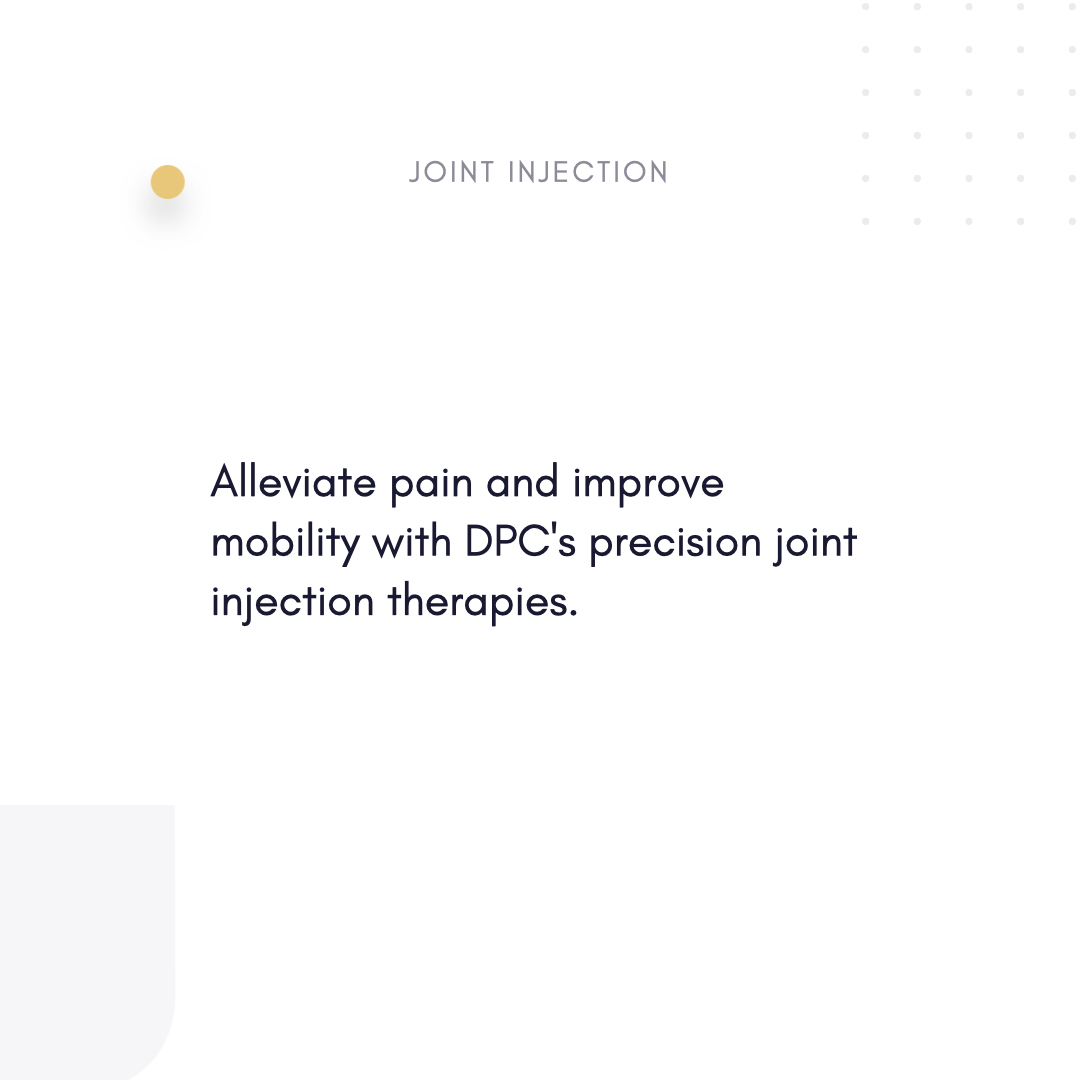Joint Injections and Direct Primary Care (DPC): Targeted Relief, Personalized Care
If arthritis, bursitis, or tendonitis makes it hard for you to move, joint injections can quickly relieve your pain. Direct primary care (DPC) makes sure this procedure is done safely, effectively, and with close follow-up.

Joint injections: a precise way to manage pain
Joint injections put medicine right into the areas that hurt:
- Corticosteroids: Help with swelling (like knee osteoarthritis).
- Hyaluronic acid: Helps joints move smoothly (viscosupplementation for OA).
- Platelet-Rich Plasma (PRP): Help tendinopathy heal.
Knees, shoulders, hips, and elbows are common places.
Important information for patients:
- Uses: relieves pain, makes things work better, and puts off surgery.
- Safety: Low risk; less than 1% chance of a temporary flare-up or infection.
- Costs: DPC has clear prices, while regular clinics charge between 200 USD and 600 USD for each injection.
Risks of not treating joint problems:
- Damage to the joints that gets worse over time and less ability to move.
How DPC Improves Care for Joint Injections
Direct Primary Care (DPC) replaces disjointed orthopedic care with a coordinated, patient-centered approach.
1. A full evaluation before the injection
- Guidance by imaging: Use ultrasound to put the needle in the right place.
- Review of medications: Change the dose of blood thinners or NSAIDs before the procedure.
- Managing conditions: Take care of diabetes or obesity that is hurting your joints.
2. Clear costs and all-around support
- Prices that include everything: Membership includes consultations, injections, and follow-ups.
- Lower fees: DPC patients pay less for each injection, saving them 100 USD to 300 USD.
- Other choices: Talk about physical therapy or braces if shots aren't the best option.
3. Recovery with kindness and lasting relief
- Access 24 hours a day, 7 days a week: Take care of swelling or pain right away after the injection.
- Personalized rehab plans: Exercises to help strengthen the muscles around them.
- Preventive care: Suggest diets, supplements, or weight loss plans that fight inflammation.
Success Stories from Real Life
- Case 1: John, 65, has osteoarthritis in his knee. John's DPC provider gave him hyaluronic acid shots, which let him garden without pain for six months.
- Case 2: Maria, 45, has tendinitis in her rotator cuff. Maria's DPC team used PRP to fix her shoulder without having to do surgery.
Frequently Asked Questions: DPC Joint Injections
- Q: How long will it take for me to feel better?
- A: Steroids: 2 to 7 days; PRP/HA: 2 to 6 weeks.
- Q: How many shots can I get?
- A: Three to four steroid shots per year for each joint to keep the cartilage from getting hurt.
- Q: Are injections guided by imaging better?
- A: Yes. Ultrasound makes sure that the results are correct, especially for deep joints like the hip and SI.
- Q: What if the shot doesn't work?
- A: DPC looks into other options, like radiofrequency ablation and surgery referrals.
What makes DPC great at joint care
The American College of Rheumatology (ACR) stresses the importance of early intervention. DPC gets things done by:
- Cutting down on wait times: 90% of injections are done in a week or less, compared to 3 weeks or more in the past.
- Ultrasound guidance cuts the rate of misplacement by 70%, which lowers the number of complications.
- Saving money: Bundled care saves members between 300 USD and 1,000 USD a year.
Final Thoughts
Joint injections in DPC aren't just for short-term relief; they are also meant to help you move freely and live fully again. With DPC, you get a partner who knows how to give you injections with medical precision and also gives you holistic support, making sure that each injection gets you closer to lasting comfort. No insurance problems, no rushed visits—just expert care that keeps you active and free.






